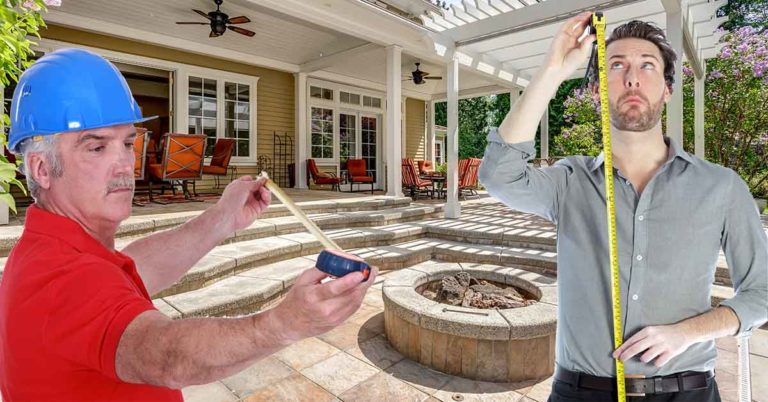Can You Leave a Gas Heater on Overnight? (13 Precautions!)
Many rely on gas heaters to keep their patio or indoors cozy and warm as the temperature drops. However, there’s often a lingering question: can you leave a gas heater on overnight?
While the convenience of a toasty patio or living room sounds appealing, safety concerns must be considered.
Below, I’ll share the precautions you should take when leaving a gas heater overnight, so let’s dive right in.
Can You Leave a Gas Heater on Overnight?
Gas heaters can successfully heat areas during chilly days.
However, is leaving one on overnight safe? While it may seem like a simple answer, the truth is that it depends on a few factors.
Firstly, it’s important to understand that gas heaters can pose a serious safety risk if not used properly.
Leaving a gas heater on overnight without proper precautions can lead to gas leaks, carbon monoxide poisoning, and even fires.
Flickr Image by Fogarty Avenue
So, ensure your gas heater is in good condition and regularly maintained. If you decide to leave your gas heater on overnight, here’s a list of key safety precautions you should follow:
1. Keep the Area Around the Heater Clear
Flammable materials or objects that could catch fire shouldn’t stay near the gas heater.
2. Use a Carbon Monoxide Detector
Carbon monoxide is a colorless and odorless gas that can be deadly if inhaled.
Installing a carbon monoxide detector in the same room as the gas heater can alert you if dangerous gas levels exist.
3. Use a Timer
Consider using a timer to switch off the gas heater after a set amount of time, such as 30 minutes. A timer can help prevent overheating and reduce the risk of fire.
4. Ensure Proper Ventilation
Gas heaters require proper ventilation to prevent the buildup of carbon monoxide.
Ensure the room where the gas heater is used has adequate ventilation, such as an open window or a vent, to allow fresh air to circulate.
5. Don’t Leave Children or Pets Unattended
Never leave children or pets unattended in a room with a gas heater, especially when it’s on. Children and pets may accidentally knock over the heater or come into contact with hot surfaces, causing burns or other injuries.
Flickr Image by Raoul and Hannah Snyman
6. Use a Stable Surface
Always place the gas heater on a stable, flat surface to prevent it from tipping over. A stable surface will help prevent fires and other accidents.
7. Follow Manufacturer Instructions
Always follow the manufacturer’s instructions for operating the gas heater to ensure you use it correctly and safely.
8. Turn Off the Heater When Not in Use
When you’re not using the gas heater, you can turn it off to save energy and reduce the risk of accidents.
9. Have a Fire Extinguisher on Hand
Keep a fire extinguisher nearby in case of emergencies. Additionally, learn how to use and maintain the fire extinguisher properly.
10. Keep the Heater Away From Water Sources
Gas heaters should be kept away from water sources, such as sinks, bathtubs, showers, or rain.
Water can damage the heater and increase the risk of electrical shock.
11. Don’t Use the Heater for Drying Clothes
Never use your gas heater for drying clothes, towels, or other fabrics. The fabrics can catch fire, leading to potentially dangerous situations.
12. Check the Gas Connection
Regularly check the gas connection for leaks; even a small leak can pose a safety risk. You can check for leaks by spraying soapy water on the connection and looking for bubbles.
13. Consider a Professional Inspection
Having a professional inspect your gas heater at least once a year is a good idea. A professional can check for issues or potential safety hazards and ensure your heater is operating correctly.
In summary, leaving a gas heater overnight is possible. However, taking the necessary precautions to ensure your safety is important.
Regular maintenance, keeping the area clear, using a carbon monoxide detector, and using a timer can all help to minimize the risk of accidents and keep you and your loved ones safe and warm during the colder months.
Is it Safe to Leave a Gas Heater on When Not Home?
Leaving a gas heater on is unsafe when you’re not home; doing so can pose serious safety risks like gas leaks, carbon monoxide poisoning, and fires.
Even if you think you’ll only be gone briefly, it’s always best to turn off your gas heater before leaving the house.
Photo by Achudh Krishna on Unsplash
Gas heaters can malfunction or develop leaks, which can release toxic gases and cause fires. These issues can go unnoticed and cause serious damage or harm if left unattended.
Additionally, if the gas supply has issues, leaving the heater on could cause a buildup of gas, which can lead to an explosion.
You should always turn off your gas heater when leaving your home. This will also help you save energy and reduce your utility bills.
If you’re forgetful or want to ensure you don’t accidentally leave the heater on, consider installing a timer or using a smart thermostat that can be controlled remotely.
In conclusion, leaving a gas heater on is never safe when you’re not home. Always turn off the heater before leaving, and take the necessary precautions to ensure the safety of yourself and your home.
What about the safety of outdoor heaters? In our other article, we look closer at the potential dangers of outdoor heaters (can they explode) and how to stay safe while using them.
How Long Can You Leave Gas Heater on?
The amount of time you can leave a gas heater on depends on several factors, such as the size of the room, the type of heater, and the temperature setting.
In general, it’s recommended that you don’t leave a gas heater on longer than necessary and always follow the manufacturer’s instructions for operating it.
As a general rule, it’s best to limit the use of a gas heater to a few hours at a time and to never leave it on overnight or when you’re not home. This will help reduce the risk of accidents, such as gas leaks, carbon monoxide poisoning, and fires.
If you’re using a gas heater to heat a small room, you may only need to use it for 30 minutes to one hour.
If you’re using the heater to heat a larger space, such as a living room, you may need to use it for longer, but it’s still important to be mindful of the risks and monitor the heater closely.
Final Words
While the temptation to leave a gas heater on overnight is understandable, the risks associated with it are not worth taking.
Following the precautions outlined in this article, you can still enjoy the comfort of a warm home without putting yourself or your family in danger.
Remember, it’s always better to be safe than sorry about your home’s heating and your family’s well-being.

